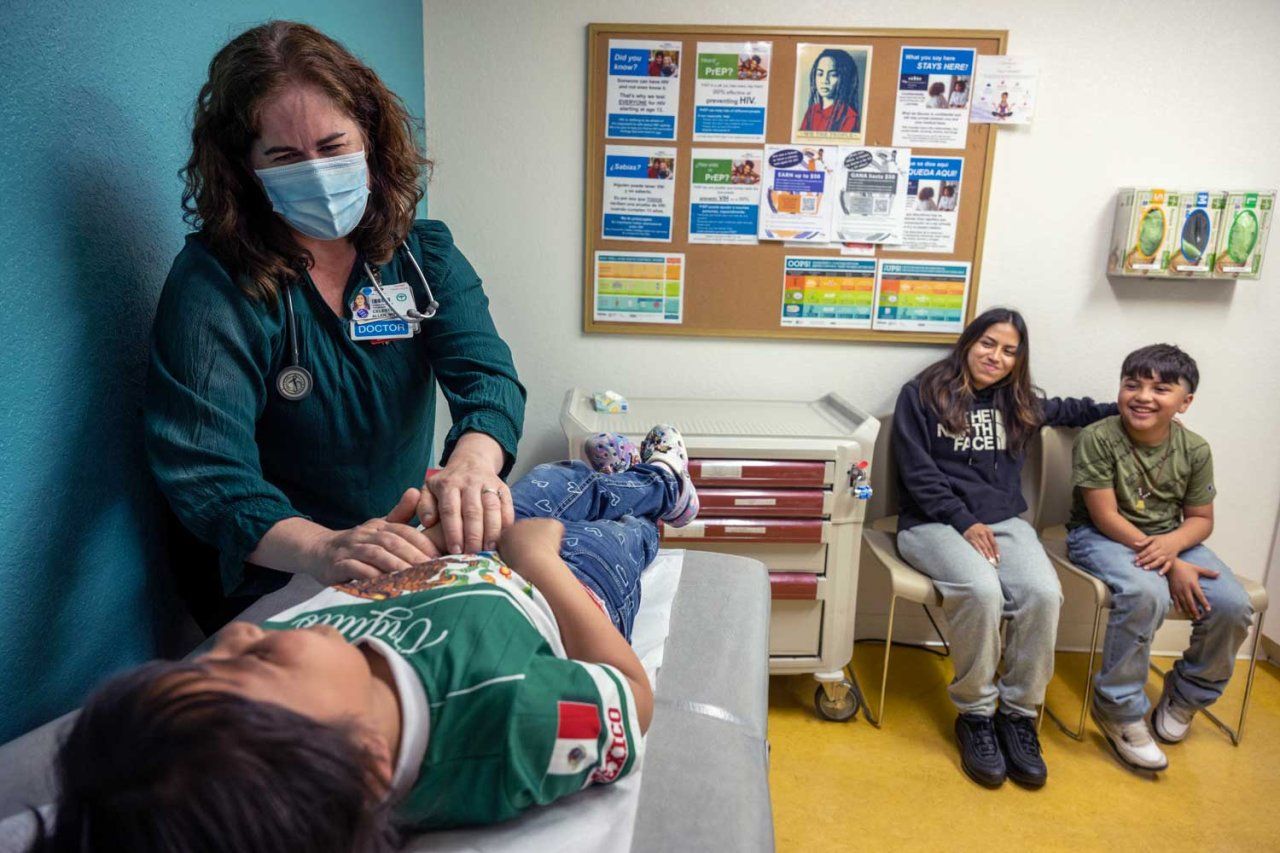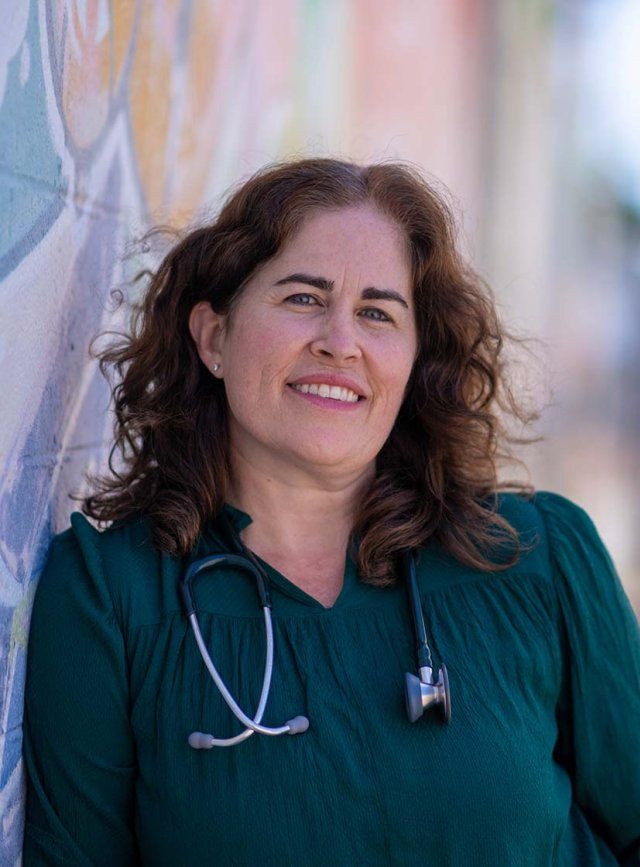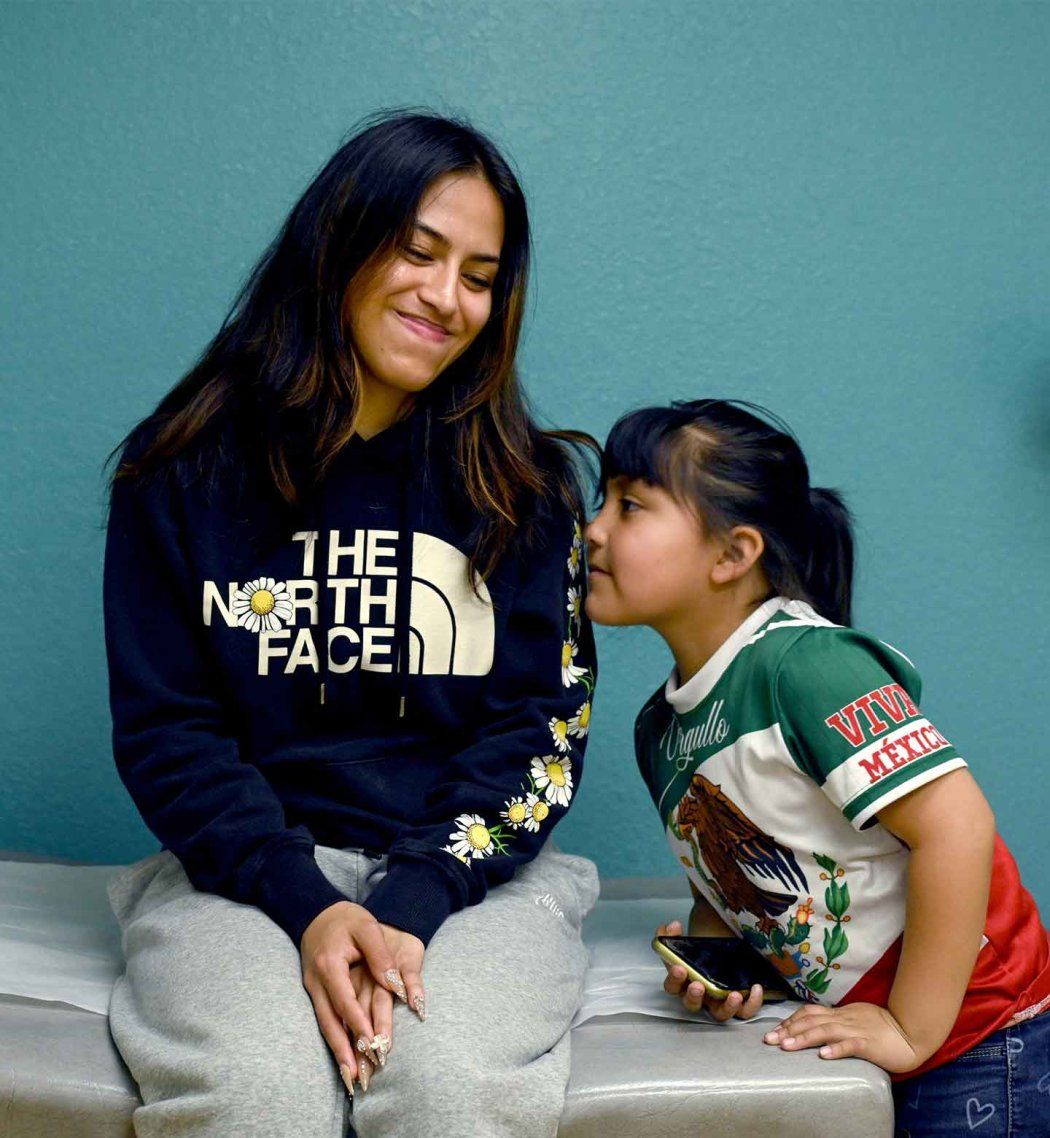At the center of the McClymonds High School quad in West Oakland is a door surrounded by a red “McClymonds Warriors” banner. A sign reads “Chappell Hayes Health Center,” and the door opens to couches in a warm and spacious waiting room. On the wall is a large portrait of Chappell Hayes, a local political activist and the clinic’s namesake. Down the hallway are fully equipped medical exam rooms.
This is not your typical “school nurse’s office.” This health clinic is one of two located at Oakland high schools that are staffed by UCSF Benioff Children’s Hospital Oakland (BCH Oakland) physicians, nurses, social workers and therapists. The McClymonds clinic and the Youth UpRising Castlemont health clinic, located across town in East Oakland next to Castlemont High, are part of an innovative initiative to provide comprehensive primary and mental health care to historically underserved students and neighbors in the surrounding communities.
“Students schedule appointments or come in for same-day needs for services ranging from well care to sports physicals, vaccinations, reproductive health care like condoms and birth control, health education sessions and behavioral health therapy,” said Celeste Allen, MD, the attending physician who has worked at the clinic since 2006. “These young people have after-school jobs, responsibilities to care for siblings and other commitments that often make it difficult for them to take care of their health needs on their own time, but fitting appointments in between classes only a short walk away, is absolutely doable.”
The clinics are open weekdays for mental health appointments from 8 a.m. to 5 p.m. either in person or via telehealth. Seven BCH Oakland physicians rotate days at the clinics, seeing patients for medical checkups and primary care two days a week at McClymonds and four days a week at Castlemont – while also fulfilling their clinical responsibilities at BCH Oakland. The clinics are open for students and the community during summer when school is not in session.
The convenience of accessing care, including mental health care right on campus is a big benefit, according to Castlemont junior Diego Garcia. “If I had to get into a car and go to therapy, I’d never go,” the 17-year-old, 4.0-student said. “I don’t like to miss class, so I make my appointments after school.” The school-based clinics were the brainchild of the late Barbara Staggers, MD, a BCH Oakland primary care physician at the hospital’s Federally Qualified Health Center (FQHC). The McClymonds’ center opened in 2003, thanks to a collaboration between BCH Oakland, students, families and the Oakland Unified School District. The Castlemont center opened in 2005. The clinics serve students, community children and young adults, with services reimbursed by MediCal and other patient insurance.

“We’re now a cornerstone of the community and families come from as far away as Hayward and San Leandro because the Youth UpRising Castlemont clinic is closer for them than the BCH Oakland Primary Care Center in North Oakland,” Allen said. “We see ages birth to 24 years old and it’s been so helpful for families to have consistent care as young adults. Our teen and young adult patients bring their babies back to the clinic for exams and vaccinations. We see siblings and other family members as well. The convenience of primary care at these locations makes a huge difference in their busy lives.”
Castlemont High School co-principal Michael Scott has seen positive changes in students who have used the clinic’s mental health services. “Students who present with behavior challenges or exhibit signs of trauma or depression, benefit from having an onsite support person to help them resolve their challenges,” Scott said. “I have seen students grow in their ability to resolve conflicts peaceably, make better decisions, and open up to teachers and staff about their support needs.”
Culturally Responsive Therapy
A large part of the onsite support is provided by Saun-Toy Trotter, psychotherapist and clinical director of the BCH Oakland school-based behavioral health program, along with her team of 14 mental health and health education counselors.
Research indicates that students who are tired, sick, stressed or depressed have a greater risk of dropping out of school and engaging in unhealthy and violent behaviors. At these clinics, students come in for mental health therapy for reasons ranging from stress during finals to gun violence and sexual trauma. The two clinics handled more than 5,600 patient visits during the 2021-22 school year. About 60% were related to mental health.
“We’re here for them,” Trotter said. “After experiencing isolation during the pandemic, young people are hungry to be in safe spaces and the culturally responsive group therapy we provide offers them an emotionally safe space to connect with a skillful therapist and each other.”
These young people have after-school jobs, responsibilities to care for siblings and other commitments that often make it difficult for them to take care of their health.
Celeste Allen, MDUCSF Benioff Children’s Hospital Oakland
Castlemont’s Garcia made his first therapy appointment out of curiosity and was impressed by how it helped his anxiety and gave him tools to cope and ease the tension. “I learned breathing techniques that I use all the time,” he said. “I like knowing what to do when I feel anxious.”
Trotter says she feels gratified to have made a difference for young patients and entire families in her almost two decades of providing behavioral health services at the two clinics. “When a young person starts to get better, their parents often refer siblings or even get help themselves to understand their own trauma,” Trotter said. “So, I see a generational change in our work — not just impacting that young person, but the whole family. It’s incredible to see the ripple effect throughout entire communities.”
New Generation of Health Leaders
For some students at McClymonds and Castlemont, access to health care is only one of the benefits of the clinics. Another is the poise and confidence they gain as health leaders on the clinics’ Youth Wellness Advisory Boards (YWAB).
YWAB is a campus-based student group, currently with 19 students between the two campuses. The students act as peer health educators and promote health and wellness in their communities. BCH Oakland health education staff, Skye Timmons and Sara Coleman, coach and empower YWAB members to build confidence and hone their leadership skills, while also exposing them to various career paths in health care.
Before, I never talked to people I didn’t know or trust. But now, I mentor new YWAB members and am in charge of the recruiting table.
McClymonds YWAB member Raven Robinson channeled her passion for organizing events into planning “Chamomile and Chill,” a de-stressing event during finals week with therapy dogs, locally sourced food and a calming gardening table. “I always loved health care, so YWAB seemed like a nice way to get involved with the clinic,” said Robinson who graduates this month. She has been accepted to UCLA in the fall where she plans to major in pre-med biology in hopes of becoming a physician or surgeon.
Garcia, who says he is a natural introvert, joined YWAB as a sophomore and said it helped build his confidence. “YWAB helped me communicate better and become more open,” Garcia said. “Before, I never talked to people I didn’t know or trust. But now, I mentor new YWAB members and am in charge of the recruiting table.”
The benefits of these full-serve health clinics are tangible and intangible, school leaders say, with students and neighbors receiving world-class physical and mental health care. And students also enjoying opportunities for leadership, career development, networking and invaluable life lessons.
Joseph Blasher, also Castlemont co-principal, considers the clinic invaluable to his school and the community. “Having a school-based health center on campus is vital for the health and wellbeing of our community,” he said. “I’ve seen how the clinic touches students’ lives, and how it touches their kids’ lives. It has grown into an integral part of our school community and become something we can depend on.”
